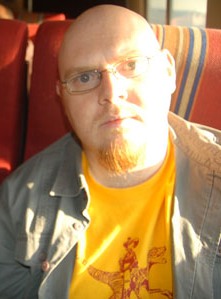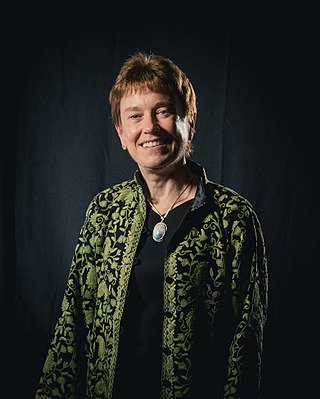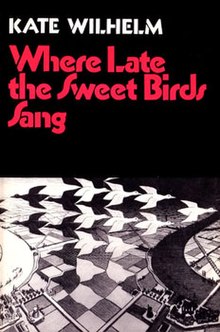
Damon Francis Knight was an American science fiction author, editor, and critic. He is the author of "To Serve Man", a 1950 short story adapted for The Twilight Zone. He was married to fellow writer Kate Wilhelm.

Friday is a 1982 science fiction novel by Robert A. Heinlein. It is the story of a female "artificial person", the eponymous Friday, genetically engineered to be stronger, faster, smarter, and generally better than normal humans. Artificial humans are widely resented, and much of the story deals with Friday's struggle both against prejudice and to conceal her enhanced attributes from other humans. The story is set in a Balkanized 21st century, in which the nations of the North American continent have been split up into a number of smaller states.

The Encyclopedia of Science Fiction (SFE) is an English language reference work on science fiction, first published in 1979. It has won the Hugo, Locus and British SF Awards. Two print editions appeared in 1979 and 1993. A third, continuously revised, edition was published online from 2011; a change of web host was announced as the launch of a fourth edition in 2021.

Damien Francis Broderick is an Australian science fiction and popular science writer and editor of some 74 books. His science fiction novel The Dreaming Dragons (1980) introduced the trope of the generation time machine, his The Judas Mandala (1982) contains the first appearance of the term "virtual reality" in science fiction, and his 1997 popular science book The Spike was the first to investigate the technological singularity in detail.

The Magazine of Fantasy & Science Fiction is a U.S. fantasy and science fiction magazine first published in 1949 by Mystery House, a subsidiary of Lawrence Spivak's Mercury Press. Editors Anthony Boucher and J. Francis McComas had approached Spivak in the mid-1940s about creating a fantasy companion to Spivak's existing mystery title, Ellery Queen's Mystery Magazine. The first issue was titled The Magazine of Fantasy, but the decision was quickly made to include science fiction as well as fantasy, and the title was changed correspondingly with the second issue. F&SF was quite different in presentation from the existing science fiction magazines of the day, most of which were in pulp format: it had no interior illustrations, no letter column, and text in a single column format, which in the opinion of science fiction historian Mike Ashley "set F&SF apart, giving it the air and authority of a superior magazine".

Kate Wilhelm was an American author. She wrote novels and stories in the science fiction, mystery, and suspense genres, including the Hugo Award–winning Where Late the Sweet Birds Sang. Wilhelm established the Clarion Workshop along with her husband Damon Knight and writer Robin Scott Wilson.
Kate Elliott is the pen name of American fantasy and science fiction writer Alis A. Rasmussen.
Literary fiction, mainstream fiction, non-genre fiction or serious fiction is a label that, in the book trade, refers to market novels that do not fit neatly into an established genre ; or, otherwise, refers to novels that are character-driven rather than plot-driven, examine the human condition, use language in an experimental or poetic fashion, or are simply considered serious art.
David Stanley Garnett is a UK science fiction author and editor. His first novel, Mirror in the Sky, was published in 1969. Three of his books are comic science fiction novels: Stargonauts, Bikini Planet and Space Wasters. He edited a paperback anthology revival of Michael Moorcock's New Worlds magazine, two Zenith anthologies of original British SF stories, and three Orbit Science Fiction Yearbooks. He also writes under the names David Ferring and David Lee.
Theodore Lockard Thomas was an American chemical engineer and patent attorney who wrote more than 50 science fiction short stories, published between the early 1950s to the late 1970s. He also collaborated on two novels with Kate Wilhelm, as well as producing stories under the pseudonyms of Leonard Lockhard and Cogswell Thomas, and was nominated for the 1967 Nebula Award for Best Short Story and for a Hugo Award.

Ben Peek is an Australian author. His middle name is Michael.
The 35th World Science Fiction Convention (Worldcon), also known as SunCon, was held on 2–5 September 1977 at the Fontainebleau Hotel in Miami Beach, Florida, United States.
Graham Sleight is a British writer, editor and critic, specialising in healthcare and science fiction. He is Head of Governance and Contracts at the Royal College of Paediatrics and Child Health, and editor of the science fiction peer-reviewed literary magazine, Foundation. His criticism has appeared in Strange Horizons, The New York Review Of Science Fiction, and Vector. He also writes a column for Locus. Several volumes in the Gollancz SF Masterworks series contain introductions written by Sleight. In 2005 and 2006 he was a judge of the Arthur C. Clarke Award. He is Managing Editor of the third edition of The Encyclopedia of Science Fiction (SFE3).

Carolyn Ives Gilman is an American historian and author of science fiction and fantasy. She has been nominated for the Nebula Award three times, and the Hugo Award twice. Her short fiction has been published in a number of magazines and publications, including Fantasy and Science Fiction, Interzone, Realms of Fantasy and Full Spectrum, along with a number of "year's best" anthologies. She is also the author of science fiction novels such as Halfway Human, which is noted for its "groundbreaking" exploration of gender.
The year 1923 was marked, in science fiction, by the following events.
The year 1928 was marked, in science fiction, by the following events.

Modern Classic Short Novels of Science Fiction is an anthology of science fiction short works edited by American writers Gardner Dozois. It was first published in hardcover by St. Martin's Griffin in February 1994, which also issued a trade paperback edition in September of the same year and an ebook edition in October 2014. A Science Fiction Book Club edition appeared in hardcover in February 1994. The first British edition was issued in hardcover by Robinson in July 1994 under the variant title The Mammoth Book of Contemporary SF Masters.
Tade Thompson is a British-born Nigerian psychiatrist best known for his science fiction novels.
A list of works by or about Kate Wilhelm, American author.

Space travel, or space flight is a classic science-fiction theme that has captivated the public and is almost archetypal for science fiction. Space travel, interplanetary or interstellar, is usually performed in space ships, and spacecraft propulsion in various works ranges from the scientifically plausible to the totally fictitious.









